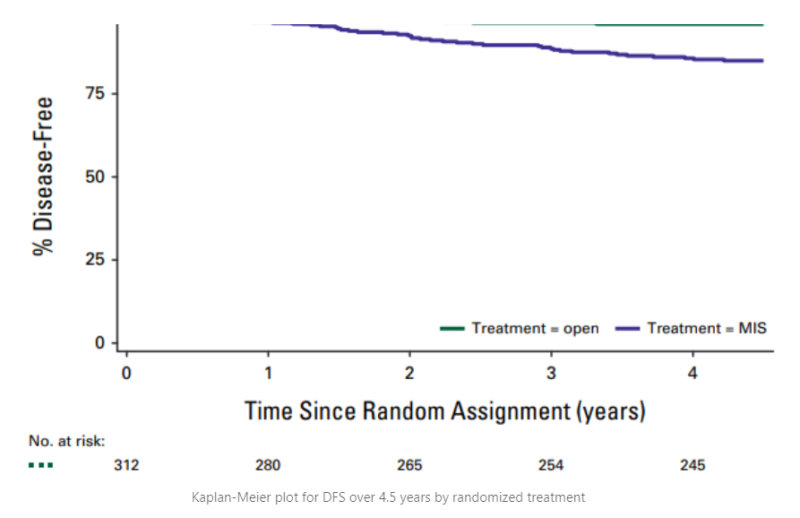Piotr Wysocki recently posted on LinkedIn:
“Pedro Ramirez et al. published the results of the phase III LACC (Laparoscopic Approach to Cervical Cancer) trial in the Journal of Clinical Oncology. The study compared overall survival between open and minimally invasive (laparoscopic and robotic-assisted) radical hysterectomies in patients with IA2-IB2 cervical cancer.
The study randomized 631 patients (1:1) to minimally invasive or open surgery. There was no difference in postoperative adjuvant therapy, with rates of 28.8% in the minimally invasive group and 27.6% in the open surgery group.
The rate of disease-free survival (DFS) at 4.5 years was 85.0% in the minimally invasive group and 96% in the open surgery group. Minimally invasive surgery was associated with almost 4 times higher risk of relapse or death compared with open surgery (HR=3.91; 95%CI 2.02 to 7.58). The significant difference remained after adjustment for age, BMI, stage of disease, lymphovascular space invasion (LVSI), lymph node involvement, and Eastern Cooperative Oncology Group (ECOG) status.
48 participants developed a recurrence (37 in the minimally invasive group and 11 in the open surgery group). The rate of locoregional recurrence at 4.5 years was 4.9% versus 1.8% in the minimally invasive versus open surgery group (HR=4.70; 95%CI, 1.95 to 11.37)
The overall survival rate at 4.5 years was 90.6% versus 96.2% for the minimally invasive and open surgery groups, respectively (HR for death of any cause – 2.71 (95%CI 1.32 to 5.59). A total of 22/28 deaths were due to cervical cancer in the minimally invasive group compared with 8/10 in the open surgery group, with a HR for disease-specific survival of 2.64 (95% CI, 1.18 to 5.93).
The study clearly shows that novel, sophisticated surgical approaches like robotic-assisted surgery do not always benefit cancer patients and that clinical trials are critical for continuous, safe progress in cancer care.”

Authors: Pedro T. Ramirez, Kristy P. Robledo, Michael Frumovitz, Rene Pareja, Reitan Ribeiro, Aldo Lopez, Xiaojian Yan, David Isla, Renato Moretti, Marcus Q. Bernardini, Val Gebski, Rebecca Asher, Vanessa Behan, Robert L. Coleman and Andreas Obermair.
Source: Piotr Wysocki/LinkedIn
Piotr Wysocki leads the Clinical Oncology Department at University Hospital and the Faculty of Oncology at Jagiellonian University-Medical College in Krakow, Poland. As an advisor to the Polish Ministry of Health, he shapes the national cancer strategy.
His clinical expertise spans the systemic treatment of breast, gynecologic, and genitourinary cancers, with a focus on developing innovative metronomic chemotherapy-based therapies for advanced cancer patients who have undergone prior treatment.
Read other posts by Piotr Wysocki published on OncoDaily.


